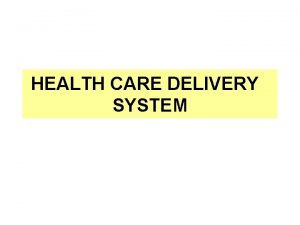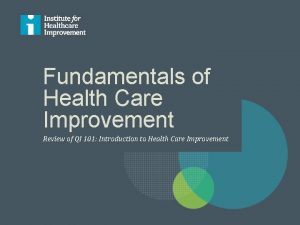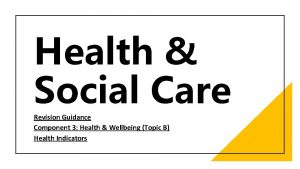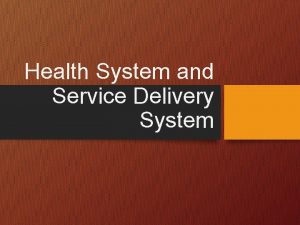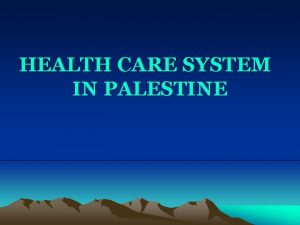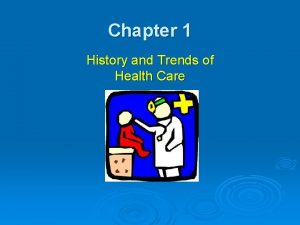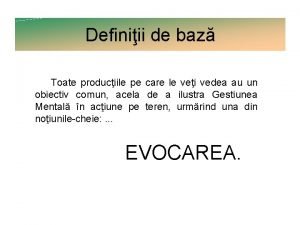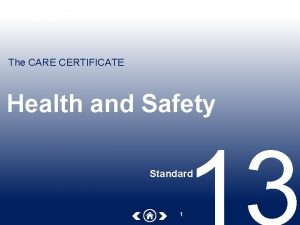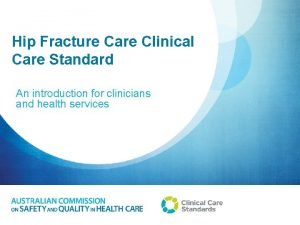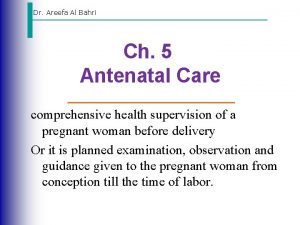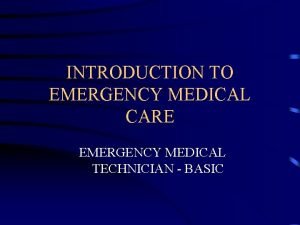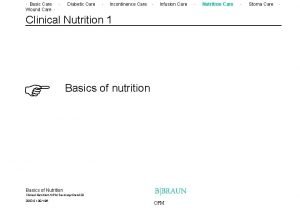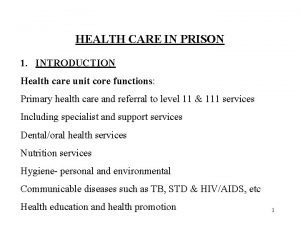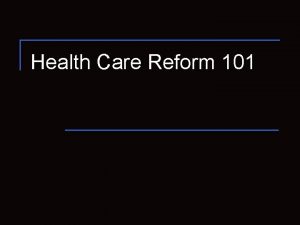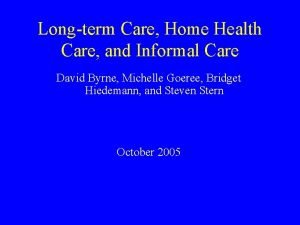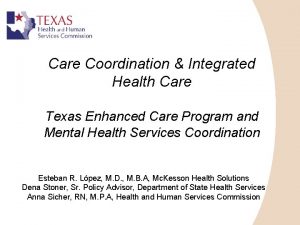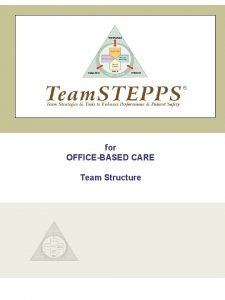Health Care System Structure Chapter 13 Introduction Health


































- Slides: 34

Health Care System: Structure Chapter 13

Introduction • Health care delivery in U. S. is different than all other developed countries • Other developed countries have national health care programs run or organized by government • Health care in U. S. delivered by an array of providers (health care facilities & professionals that provide care)

First question… Does the U. S. really have a health care system? Providers + Consumers (patients) = System?

Brief History of Health Care Delivery in the U. S. - 1

Brief History of Health Care Delivery in the U. S. - 2 Timeline Pre-1870 Today

Brief History of Health Care Delivery in the U. S. - 3 • Far behind Great Britain & Europe in both health care & medical education • Not grounded in science • Medical education was provided through apprenticeships Pre 1870

Brief History of Health Care Delivery in the U. S. - 4 • Health care provided in patients’ homes • Hospitals in large cities & seaports • Almshouses (poorhouse) to provide food, shelter & basic care for indigent Pre 1870

Brief History of Health Care Delivery in the U. S. - 5 • Health care moved from patients’ homes to physician’s office & hospitals • Health care based on more science Pre 1870 1900

Brief History of Health Care Delivery in the U. S. - 6 1 st health insurance Pre- 1900 1911 1870

Brief History of Health Care Delivery in the U. S. - 7 Flu epidemic Pre- 1900 1911 1918 -19 1870

Brief History of Health Care Delivery in the U. S. - 8 Spending 3. 9% of GDP on health Pre- 1900 1911 1918 1929 1870

Brief History of Health Care Delivery in the U. S. - 9 • Diagnosis, treatment, fee • WWII & medical advances • Hill-Burton Act Pre- 1900 1911 1918 1929 1930 s 1870 & 1940 s

Brief History of Health Care Delivery in the U. S. - 10 • Right or privilege • Overall shortage & maldistribution • 3 rd party system takes hold • Medicaid & Medicare Pre- 1900 1911 1918 1929 30 s/40 s 1870 1950 s & 60 s

Brief History of Health Care Delivery in the U. S. - 11 • Cost containment • Health planning agencies • HMO Act 1973 Pre- 1900 1911 1918 1929 30 s/40 s 1970 s 1870 50 s/60 s

Brief History of Health Care Delivery in the U. S. - 12 • Deregulation • New medical technologies Pre- 1900 1911 1918 1929 30 s/40 s 70 s 1980 s 1870 50 s/60 s

Brief History of Health Care Delivery in the U. S. - 13 • American Health Security Act of 1993 • Managed care • Costs hit $1 trillion 1990 s Pre- 1900 1911 1918 1929 30 s/40 s 70 s 1870 50 s/60 s 80 s

Brief History of Health Care Delivery in the U. S. - 14 • Medicare Modernization Act of 2003 • Health Savings Accounts • No patients’ bill of rights • GDP 16. 2% 90 s Pre- 1900 1911 1918 1929 30 s/40 s 70 s 80 s 2000 s 1870 50 s/60 s

Spectrum of Health Care Delivery - 1 • Spectrum of care refers to the type of health care practice • Population-based Public Health Practice (health promotion & disease prevention) • Medical Practice • Primary Care: clinical preventive services; 1 st contact; front-line • Secondary Care: specialized attention (acute & subacute care); e. g. , ERs • Tertiary Care: Subspecialty referral

Spectrum of Health Care Delivery - 2 • Long-term practice • Restorative care: intermediate follow-up • Long-term care: care for chronic conditions; personal care • End-of-life practice • Care provided in last six months of life: hospice care

Types of Health Care Providers - 1 • In 2005, 14 million health care workers; 9. 9% of workforce • 42% work in hospitals as compared to 63% in 1970 • Over 200 different careers in the health care industry • Six categories: independent providers, limited care providers, nurses, nonphysician practitioners, allied health care professionals, public health professionals

Types of Health Care Providers - 2 • Independent providers: health care professionals with the education & legal authority to treat any health problem • Allopathic providers: MDs; their remedies produce effects different from those of the disease • Osteopathic providers: DOs; their remedies emphasize the interrelationships of the body’s systems in diagnosis, prevention, & treatment

Types of Health Care Providers - 3 • Nonallopatic providers: independent providers who provide nontraditional forms of health care • Examples: chiropractors (adjusts spinal column), acupuncturists, naturopaths, herbalists, homeopaths • Five general categories of complementary & alternative medicine (CAM): Alternate medical systems, mind/body interventions, biologically-based therapy, manipulative methods, energy therapy

Types of Health Care Providers - 4 • Limited care (restricted care) providers: those who provide care for a specific part of the body • Examples: dentists, optometrists, podiatrists, & psychologists

Types of Health Care Providers - 5 • Nurses – Licensed Practical (Vocational) Nurses (LPNs): 1 -2 years of training & carry out nontechnical duties – Registered Nurses (RN): diploma or associate degree & state license – Professional nurses: Bachelor of Science in Nursing (BSN); prepared for additional activities involving independent judgment – Advanced Practice Nurses (APN): master’s or doctoral degrees; e. g. , nurse practitioners, clinical nurse specialists, certified nurse midwife

Registered Nurses Prepared for Advance Practice, 2004 © Department of Health and Human Services

Types of Health Care Providers - 6 • Nonphysician Practitioners (also known as nonphysician clinicians or midlevel providers or physician extenders • Examples: nurse practitioners (NPs) & physician assistants (PAs)

Types of Health Care Providers - 7 • Allied health care professionals – Provide services that assist, facilitate, & complement work of physicians & other health care specialists – Examples: dietitians, physical therapists, medical technologists, EMTs, speech therapists, & exercise physiologists

Types of Health Care Providers - 8 • Public health professionals – A health care worker who works in a public health organization – Examples: environmental health workers, public health administrators, epidemiologists, health educators, & biostatisticians

Health Care Facilities & Their Accreditation - 1 • Health care facilities: physical settings • Practitioner offices: privately owned practices • Clinics: no beds; tax-supported clinics for medically indigent called public health clinics or community health centers

Health Care Facilities & Their Accreditation - 2 • Hospital types – Provide secondary & tertiary care – Private (proprietary or investor-owned); specialty (provide mainly one type of medicine) – Public (government run or funded) – Voluntary (not-for-profit) – Types of service: full-service; limited-service

Health Care Facilities & Their Accreditation - 3 • Outpatient & ambulatory care facilities: those that provide a wide array of outpatient services; they can range from hospital-based facilities to independently owned freestanding facilities • Include: primary care centers, urgent/emergent care centers, ambulatory surgery centers, diagnostic imaging centers • Some found in nontraditional settings

Health Care Facilities & Their Accreditation - 4 • Rehabilitation Centers – Used to restore lost functions – Ambulatory & inpatient facilities • Long-term Care Options – Residential care (e. g. , nursing home & assisted living) – Home health care – Hospice, and home care

Health Care Facilities & Their Accreditation - 5 • Accreditation: process by which an agency or organization evaluates & recognizes an institution as meeting certain predetermined standards • Agencies/Organizations – Joint Commission on Accreditation of Health Care Organizations (JCAHO): 15, 000 facilities – Centers for Medicare & Medicaid Services (CMS): grants “deeming authority”

Health Care System: Structure Chapter 13 - The End
 Introduction to healthcare delivery systems
Introduction to healthcare delivery systems Health care agencies introduction
Health care agencies introduction Primary secondary tertiary health care definition
Primary secondary tertiary health care definition Unit 2 equality diversity and rights
Unit 2 equality diversity and rights Ihi leadership alliance
Ihi leadership alliance Qi 101: introduction to health care improvement
Qi 101: introduction to health care improvement Conclusion paragraph format
Conclusion paragraph format Health and social care component 3 health and wellbeing
Health and social care component 3 health and wellbeing It service delivery objectives
It service delivery objectives Secondary care definition
Secondary care definition Health care system definition
Health care system definition Chapter 3 careers in healthcare
Chapter 3 careers in healthcare Test chapter 3 careers in health care
Test chapter 3 careers in health care Chapter 12 computer technology in health care
Chapter 12 computer technology in health care Chapter 1 history and trends of healthcare
Chapter 1 history and trends of healthcare Chapter 2 health care systems
Chapter 2 health care systems Chapter 1 history and trends of healthcare
Chapter 1 history and trends of healthcare Chapter 13 diversity and difference in health care
Chapter 13 diversity and difference in health care Chapter 3 careers in health care
Chapter 3 careers in health care Duty of care care certificate
Duty of care care certificate Magneti artificiali
Magneti artificiali Palliative care vs hospice care
Palliative care vs hospice care Cum se numesc animalele care fac oua
Cum se numesc animalele care fac oua Care sunt simturile prin care sunt evocate
Care sunt simturile prin care sunt evocate Care certificate answers standard 2
Care certificate answers standard 2 Hip fracture clinical care standard
Hip fracture clinical care standard Chapter 3 health wellness and health disparities
Chapter 3 health wellness and health disparities Chapter 1 lesson 2 what affects your health
Chapter 1 lesson 2 what affects your health Understanding health and wellness
Understanding health and wellness Modern concept of pediatric nursing
Modern concept of pediatric nursing Introduction modern concept of child care
Introduction modern concept of child care Introduction to emergency medical care
Introduction to emergency medical care Site:slidetodoc.com
Site:slidetodoc.com Introduction to emergency medical care
Introduction to emergency medical care Introduction to emergency medical care
Introduction to emergency medical care
